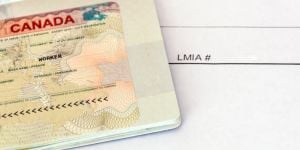
When you arrive in Canada, here are some tips on what you should do to access healthcare services.
Depending on the Canadian residency permit you hold and your country of origin, you might qualify for basic health coverage upon arrival, similar to Canadian citizens. If you're not eligible, you'll need to obtain private insurance before leaving. Your status concerning the Canadian healthcare system will be determined during your permit application process.
Upon your arrival in Canada, you might need to undergo a second medical examination similar to the one you had before becoming a Canadian resident. This serves as a health surveillance measure for individuals who may have an inactive infectious disease. To comply with this requirement, it's essential to reach out to the health authorities in your province within 7 or 30 days of arriving in Canada.
The Canadian healthcare system
Canada's healthcare system varies from province to province and territory to territory. However, certain features are common to all programs: benefiting from local health insurance generally means you don't have to pay directly for most health services. To benefit from it, you simply need to show your provincial health insurance card before seeking care or having a consultation.
Consider getting additional insurance for specific services that may not be covered by the basic health insurance plan in your province of residence, such as prescription drugs, dental care, osteopathy, ambulance costs, and more.
In Canada, you have the option to seek medical care from a general practitioner or a specialist or visit a hospital or clinic. Nurses and pharmacists are also available to offer advice and care. Keep in mind that there are usually lengthy waiting times for medical appointments and emergencies at hospitals.
Additionally, finding a doctor accepting new patients can be challenging.
If you're ill, you may prefer to go to a public clinic. These are often called "walk-in clinics", but in reality, you'll often have to call the day before or early in the morning to reserve your place. In others, you'll have to arrive early and hope to be seen before closing time. Some clinics do not accept new patients. Private clinics are more flexible but more expensive. For more information, consult your provincial health services directory:
Registering for health insurance in Canada
When you arrive in Canada, don't delay in registering for public health insurance in the province where you will be living:
- Quebec Health Insurance Plan (RAMQ);
- Alberta Health Insurance Plan (AHIP);
- Ontario Health Insurance Plan (OHIP);
- Saskatchewan Health Service (SHS);
- New Brunswick Medicare;
- Medical Services Plan (MSP) in British Columbia.
To do so, you'll need to visit your provincial health plan service center and complete a registration form. To find a list of service centers, visit your provincial health insurance plan or provincial government website. You'll need to bring identification such as your passport and permanent resident card or work permit. Some provinces also require proof of address. The card you receive will include your personal details, such as name, address, date of birth and gender. You'll need to carry it with you when you visit a hospital or clinic. In some provinces, only adults receive a health insurance card with the details of each family member, while in others, everyone receives their own card.
Good to know:
Always carry your card with you, never lend it to anyone, and never lose it. You could lose the benefits of your card if you lend it to anyone. You could also face criminal charges and deportation from Canada. In the event of loss, you may have to pay replacement costs. For more information, please consult your provincial Ministry of Health or the Canadian Immigration Service website.
Private health insurance in Canada
Unless there are specific provisions tailored to your situation, you typically need to wait for 3 months before you can start availing yourself of health insurance in your province of residence. During this waiting period, it's advisable to explore temporary private insurance options, like travel insurance or expatriation insurance.cc
Temporary residents in Canada, such as WHPists, are obliged to take out this type of insurance before their departure. Globe PVT is one of the most popular types of insurance for WHPists.
Depending on the options you choose, private health insurance covers services such as dental care, hospital care, prescription drugs and eyeglasses, repatriation, and so on. If you work in Canada, your employer will most likely offer you complementary health insurance. In Quebec, you're even obliged to take out the insurance offered by your employer.
What to do in an emergency in Canada
In the event of an emergency, the number to dial is 911. Whether it's a fire, accident or other type of medical emergency, this number puts you in touch with a team of medical personnel and first-aiders specially trained to respond to emergencies.
When you dial 911, a switchboard operator will connect you to emergency services like the police, fire department, or ambulance. It's crucial to provide details about the emergency, your exact address, the condition of the person in distress, and, if possible, the cause of the incident. Follow the caller's instructions until help arrives.
MedicAlert in Canada
If you suffer from a serious illness such as diabetes or high blood pressure or have allergies, you may want to look into MedicAlert devices. This Canadian foundation provides customizable bracelets that will help doctors treat you in an emergency, thanks to the information they provide about you. Your bracelet is engraved with MedicAlert's 24-hour emergency service phone number, your personal membership number, and your urgent medical needs. Make sure you always have the bracelet with you when you need it. You can order one from the MedicAlert website.
Vaccination in Canada
In Canada, vaccines are available against several diseases, including tetanus, whooping cough, polio, rubella, measles, mumps, hepatitis B, and diphtheria. The majority of Canadian residents choose to be vaccinated against serious diseases. Vaccinations are free for children in all Canadian provinces and territories. Vaccination is not compulsory.
Schools in some provinces require children to be vaccinated against specific diseases to enroll. To verify the need for other vaccinations for your children, please consult a physician. Also, if you're planning to travel, make sure you've had all the necessary vaccinations.
Being pregnant in Canada
Temporary residents on a tourist visa or a Working Holiday Permit (WHP) are not eligible for health insurance in Canada. If they become pregnant, they will have to pay the full cost of pregnancy follow-up and delivery and have their own private insurance. These costs are very high, although they may vary according to the province of residence of the mother-to-be and the hospitals involved. On the other hand, permanent residents and women with work permits other than the WHP benefit from health insurance and will generally not have to pay for pregnancy follow-up or childbirth costs.
In Canada, you can give birth in a hospital, in a birth center in Quebec or even at home. Birthing centers are facilities staffed exclusively by midwives. Birth in a birth center or at home is reserved for women whose pregnancy presents no risk. Please note that epidurals are not available in birth centers or at home.
Prenatal pregnancy follow-up and the number of ultrasounds may vary by province and clinic. In Quebec, for example, you'll be offered an initial consultation during the first 11 weeks of pregnancy, then a consultation every 4 to 6 weeks from the 12th to the 30th week of pregnancy, and a consultation every 2 or 3 weeks from the 31st to the 36th week. Finally, from 37 weeks to delivery, you'll have one consultation a week. You can consult this page to learn more about the frequency of visits in British Columbia, and this one if you're pregnant in Toronto.
According to the Institut national de santé publique du Québec, pregnancy monitoring includes regular consultations with your health care professional, blood tests, urine and vaginal swabs, ultrasounds and genetic screening tests, in some cases.
If a child is born in Canada, they automatically acquire Canadian nationality. However, it is strictly prohibited to come to Canada solely for the purpose of giving birth. Moreover, parents are required to cover medical expenses, which may exceed CAD$10,000.
The average hospital stay following natural childbirth is 2 days, or 3.5 days for cesarean sections. Canada has a wide range of postnatal care services for the well-being of mothers and their newborns after childbirth. You can consult the complete guide to postnatal care in Canada on the Canadian government website.
Dental care in Canada
Public health insurance plans in Canada do not cover dental care. Private insurance paid for by individuals or employers, therefore, plays an essential role in oral health in this country. According to the Canadian Dental Association, Canadians often have to cover the cost of dental care themselves, and they do so in one of four ways: through a third-party payer (employment-based dental coverage), a private dental plan (non-employment-based dental coverage), out-of-pocket payments or government-subsidized programs. Don't hesitate to ask a potential employer for information on available coverage.
The Canadian Interim Dental Benefit can reduce the cost of dental care for families who qualify. Parents are eligible if the entire family earns less than $90,000 a year, and if they must pay for the dental care of a child under age 12 who does not have access to a private dental insurance plan.
Drugs and pharmacies in Canada
Public health insurance plans in Canada do not cover drugs except for prescription drugs administered in Canadian hospitals. Outside the hospital setting, where drugs are publicly subsidized, provincial and territorial governments define their own public drug plans and choose which prescription drugs are covered. Many Canadians benefit from drug insurance through their employment, but others do not benefit from effective coverage and must pay the full cost of prescription drugs.
Good to know:
Similar to dental care and medication, vision care is not included in the public health insurance plan.
Useful links:
Canadian Immigration Service - Health Insurance
We do our best to provide accurate and up to date information. However, if you have noticed any inaccuracies in this article, please let us know in the comments section below.











